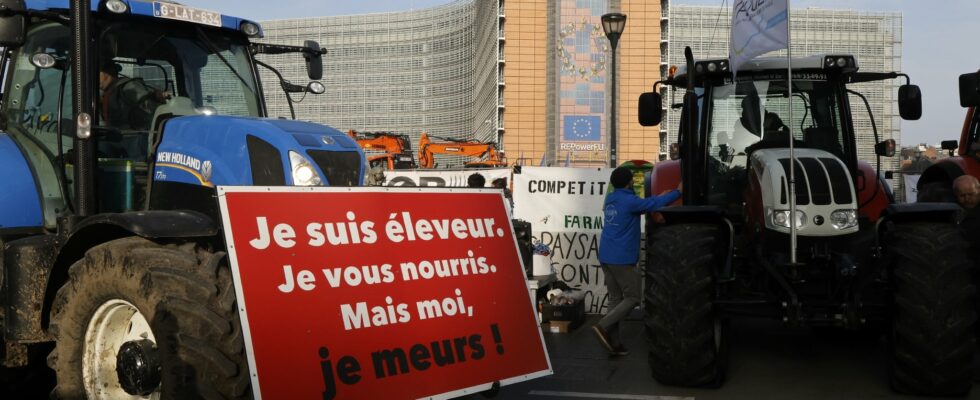Is the anger of the agricultural world starting to flare up again? In any case, this is the threat that trade union organizations are increasingly looming over, almost a year after the movement which shook all of Europe. The FNSEA and the Young Farmers (JA), which constitute the majority union alliance in France, launched this Wednesday, November 13, a call for a national mobilization of farmers “from Monday”, and in order to “attract the attention public authorities” on their demands.
The cause of this anger lies, for once, on the side of Brussels. And more specifically about the Mercosur free trade agreement between Latin America and the EU, which the European Commission seems determined to sign by the end of the year after more than twenty years of negotiations unsuccessful. A treaty that agricultural organizations reject in unison. “We will be in all departments from Monday for a few days, to make the voice of France heard during the G20 in Brazil,” said the president of the FNSEA Arnaud Rousseau at the microphone of France Inter this Wednesday morning . “This mobilization is there to express the anger of the farmers,” added Pierrick Horel, head of the JA.
France put in a minority in Brussels?
This agreement plans to massively reduce customs duties between the Latin American Mercosur countries (Brazil, Argentina, Paraguay and Uruguay) and the European Union for agricultural products such as beef, poultry, sugar, corn or ethanol again. And this, on the basis of import quotas which could not be exceeded. These ceilings, for example set between 90,000 to 100,000 tonnes per year for South American beef, as well as France’s promise to integrate mirror clauses – the same phytosanitary and environmental standards must be applied – have not not enough to calm the anger of the agricultural world, who rail against an agreement that they consider unequal and unfair.
Farmers are particularly concerned about unfair competition given the lower cost of labor in Latin America, or the use by these countries of products banned within the EU such as pesticides or growth-promoting antibiotics. “The production costs of Brazilian farmers are half as high as ours. Impossible to be competitive,” he told L’Express in particular. Franck Laborde, president of AGPM, the General Association of Corn Producers.
France, for its part, has no longer hidden its opposition to this agreement in recent months, with Emmanuel Macron himself affirming that this treaty was “not acceptable” as it stands. “France says no and France is not alone in this refusal of Mercosur. What we must obtain is enough to exercise our veto at the European level” by rallying “as many countries” as possible from the EU , Annie Genevard, French Minister of Agriculture, explained this Monday.
Because the European Union, under the leadership of Germany and Spain, for its part seems determined to have this agreement voted on. “We have two key dates […] : the G20 summit in November in Rio de Janeiro, and the Mercosur summit in December this year. We are therefore going to work on the realization of this great project,” said Spanish Prime Minister Pedro Sanchez. And this, overcoming the opposition of France, which is seeking to bring together enough European countries behind it to succeed in opposing it. its veto within the EU institutions.
“We will be on the roundabouts and boulevards of Europe”
For its part, the agricultural world seems determined to throw all its weight into the balance to protest against the signing of this treaty. The French beef, poultry, cereal and sugar sectors announced this Wednesday that they were forming a united front against Mercosur, assuring that they wanted to “give strength” to the mobilization launched by the FNSEA and the Young Farmers by saying “no” with “one voice” to this agreement. Several European agricultural organizations are also demonstrating this Wednesday in Brussels, a sign that tensions go beyond French borders. During the agricultural discontent last winter, the refusal of Mercosur was already part of the demands of the peasant world, throughout Europe.
For the moment, the mobilization is not aimed at massively blocking the highways, as was the case last winter. But rather to bear witness to this anger, allowing other actions to take place if their voice was not heard “We will be on the roundabouts and boulevards of Europe to denounce this European inconsistency” promised Pierrick Horel, president of the union Young farmers, specifying that they do not want to “take French citizens hostage”. A position confirmed by the boss of the FNSEA Arnaud Rousseau, who affirmed that the objective of this mobilization was neither “to block” nor “to starve” France. Prime Minister Michel Barnier will be on his side this Wednesday in Brussels where he will meet the President of the European Commission Ursula von der Leyen, and thus try to make France’s position heard with the EU. A life-size test to know whether or not the voice of Paris is still heard in Brussels.
